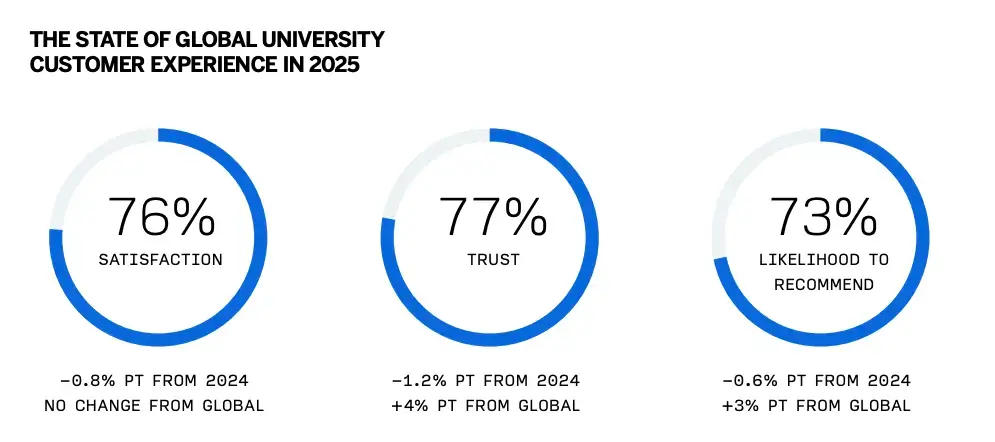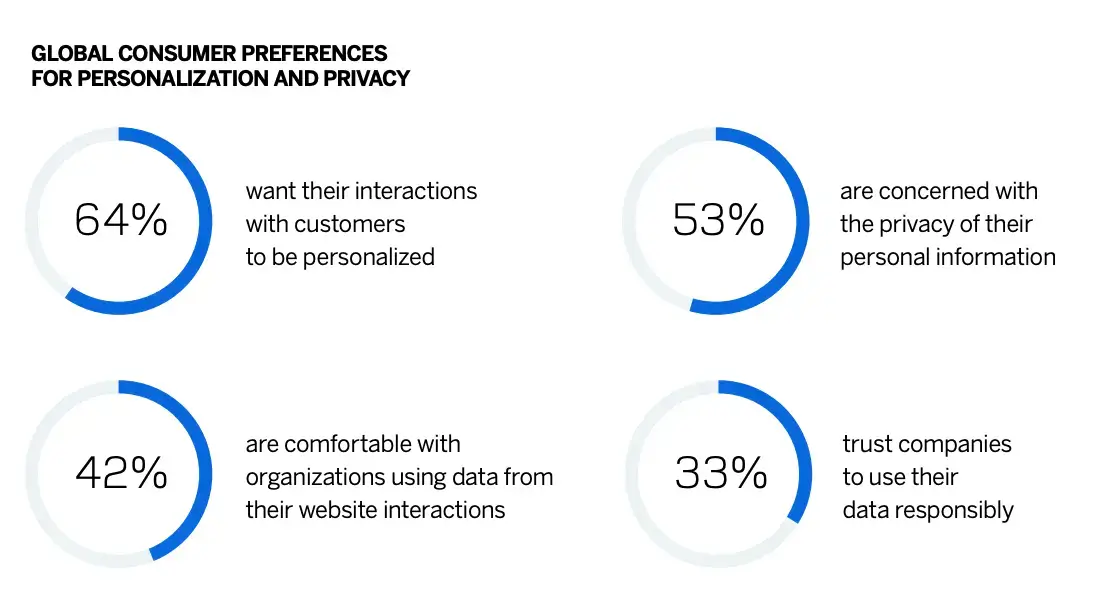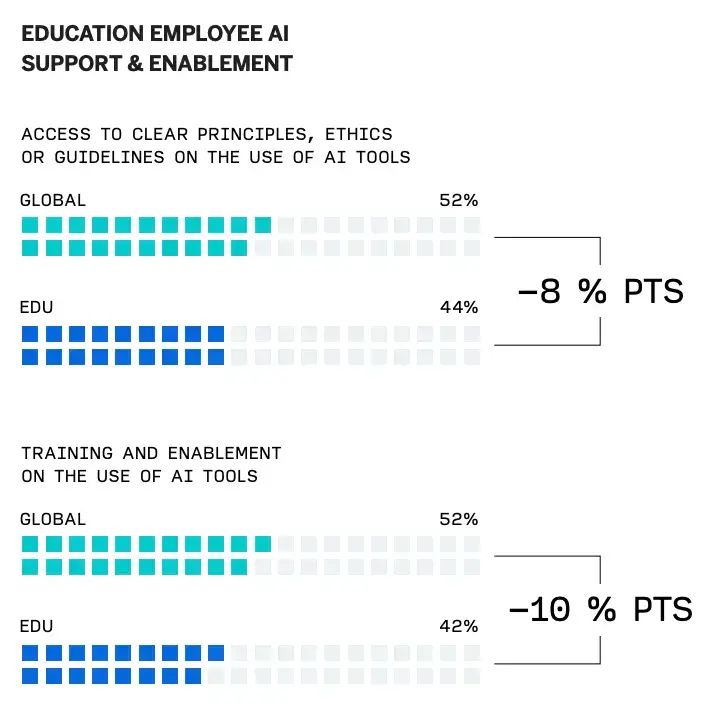Employee engagement in K-12 and higher education remains stable but lags behind other industries, raising concerns about leadership trust and employee wellbeing. Educators play a critical role in adopting new technologies and pedagogical approaches to improve student outcomes.
The sector is also under pressure from rapid technological change, evolving privacy expectations, and demands for personalized, inclusive learning. Improving student access and addressing the digital divide are essential to ensure equitable opportunities for all learners. Workforce demands and the need to align education with workforce trends are shaping curriculum and program offerings to better prepare students for the evolving job market. Rebuilding trust through clear communication, empowering staff, and thoughtfully integrating technology to enhance human connection will be crucial. Success depends on balancing innovation with the mission of supporting diverse learners in inclusive, responsive environments. The rise of accelerated degree programs reflects a response to labor market and career needs, offering students faster, cost-effective pathways to workforce entry.
Download the full 2025 State of Experience in Education report for detailed insights
Trust is foundational
Customer trust in universities has declined by 1.2 percentage points since 2024, while customer satisfaction dropped by 0.8 points. This contrasts with slight increases in other industries. Poor experiences, often caused by communication issues and employee interactions, happen more frequently in universities than elsewhere. Fourteen percent of university customers reported a bad experience in the last 90 days, compared to the 12% global average. This puts 7% of global university sales at risk.
Trust in senior leadership within education is also low; only 59% of education employees worldwide say they trust their leaders, four points below the global average. This stems from perceptions that leaders prioritize immediate gains over employee wellbeing. The evolving responsibilities of chief academic officers and other leadership roles are critical in rebuilding trust and guiding institutional change, especially as higher education faces leadership turnover and the need for effective succession planning. To rebuild trust, institutions must improve communication by creating clear channels for feedback and showing how input leads to change. Prioritizing competence, integrity, and benevolence through honest communication and strong employee support will strengthen trust, which is essential for lasting success. Institutions can gain valuable insights and advantages by investing in educational leadership development and strategic planning to adapt to ongoing sectoral and technological changes.

Keeping pace with rapid change
Today’s learners expect personalized learning experiences tailored to their needs, yet privacy concerns remain high. Over half worry about personal data privacy, and only one in three trusts companies to use their data responsibly. Educational institutions must balance personalization with privacy while maintaining human interactions. Protecting student data is essential, and addressing the digital divide is crucial to ensure equitable student access to educational opportunities.
More than half (54%) of consumers who had poor university experiences cited employee interactions as a key issue. The 2025 Employee Experience Trends study shows education employees feel less supported than peers in other sectors when it comes to meeting customer needs, developing new approaches, improving work processes, and adapting to change.
Schools and universities can empower staff by providing digital tools, new technologies, and guidelines that respect student privacy. They can also use student experience management systems to better understand feedback. Centralizing student information prevents repetitive interactions and improves personalized engagement.
Supporting employees through change builds trust, inclusion, and purpose. This leads to empathetic, responsive service for students and families. Embedding continuous improvement and experience insights into decision-making helps institutions enhance service and create a values-driven culture focused on student success. Staff development should include building technical skills and leveraging data analysis to inform decisions and improve student engagement.

Using AI with intention
AI is transforming education by automating routine tasks and improving service without losing the human touch. However, consumer comfort with AI declined in 2025. People prefer AI to handle routine tasks rather than personal interactions, highlighting the need for balance.
Education employees mainly use AI for online search, idea generation, and writing, reflecting academic priorities. Generative AI and AI-powered tools are increasingly used to create lesson plans, multimedia resources, and interactive quizzes, making content creation more efficient and current. Educators play a crucial role in adopting these technologies, and supporting each educator with proper training and resources is essential for effective integration of AI into teaching. Many educators adopt AI on their own because employers provide limited training and guidelines—40% rely on self-directed use, which is higher than the global average.
Institutions should offer curated AI resources and training to optimize productivity and responsible use. Tailored AI solutions can improve efficiency while preserving trust and meaningful human connections.

What’s next?
The future of Experience Management in education lies in balancing fast technological advances with the mission of fostering trust, societal good, and student preparedness. Among the emerging trends and trends to watch are new academic programs, such as accelerated degree programs and innovative curriculum models, designed to prepare students for careers and meet evolving industry needs.
AI-driven tools, personalized learning platforms, and real-time analytics will improve student and employee experiences while emphasizing human-centered values. Higher education institutions and many colleges are leveraging new technology and forming strategic partnerships with other universities and employers to align academic programs and curriculum with labor market and workforce demands. These efforts help students gain relevant skills, knowledge, and credentials, including bachelor's degrees, to address workforce gaps and support career advancement.
Modern curriculum increasingly emphasizes skills such as problem solving and critical thinking, with colleges and schools adapting to ensure students learn and demonstrate these competencies. Financial aid options, increasing costs, and sustainability are key considerations for colleges and higher education institutions in the next five years, as they seek to expand student access and maintain affordability.
Student access, student performance, and the knowledge learned are being enhanced through innovative classroom and world-based learning experiences, including digital worlds, hybrid models, and immersive technologies. These approaches help students learn more effectively and prepare for diverse careers. Educational leadership, systemness, and campus leaders play a crucial role in driving these trends and focuses, ensuring that academic programs remain relevant and responsive.
Staying informed about educational technology and emerging trends is essential for colleges and higher education institutions to maintain competitive and effective academic programs. The role of bachelor's degrees, college, and accelerated degree programs remains central in providing career pathways and addressing workforce and labor market demands. Experience Management will focus on creating fair, responsive, and emotionally intelligent learning environments that honor diversity and embrace innovation. Combining data insights with deep listening and ethical design will boost satisfaction, outcomes, and long-term trust. This ensures technology supports teaching and learning effectively.
How Qualtrics can help
Qualtrics helps education organizations deliver exceptional service, build strong teams, and make informed decisions with AI-powered Experience Management (XM). Our platform provides organizations real-time insights into student and employee sentiment for more meaningful actions that improve student and staff engagement, satisfaction, and retention, keeping education programs and online learning centered on people.
Free eBook: 2025 State of Experience in Education Report



